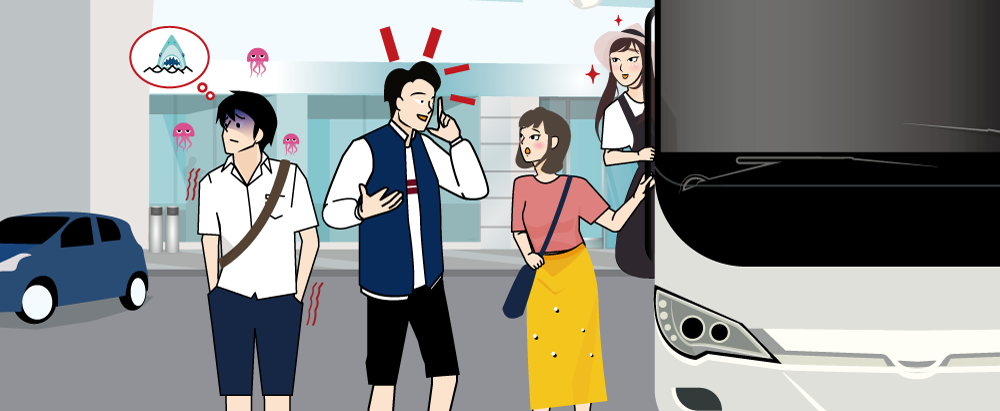Today's Point
今日のポイントbefore「かつて」、once「一度」、twice「2度」、~ times「~回」などの時や回数を表す語とともに用いることが多いです。
なお、〈have/has been to ~〉は「~へ行ったことがある」という『経験』を意味しますが、〈have/has gone to ~〉は「~へ行ってしまった(そして今ここにはいない)」という『完了・結果』を表しますので注意してください。

「マクタン島には何度も行ったことがある」というマイクのお勧めはシャングリラ・ビーチリゾート。
ビーチはとても綺麗で魚がたくさん泳いでいて、シュノーケリングも楽しめます。
ケンは、というと、、、「サメはいないの?」「クラゲは?」と変な妄想が広がっているみたいです。

Story of the Day
今日のストーリーRepeat after your teacher.
先生の後に続けて言ってみましょう。
| Mike : I have been to Mactan Island many times. | マイク : マクタン島には何度も行ってるんだ。 |
|---|---|
| Mike : My favorite spot is Shangri La Beach. | マイク : シャングリラビーチがお気に入りさ。 |
| Jiu : I’ve never been to that beach before. | ジウ : そのビーチは行ったことないわ。 |
| Mike : It’s great. | マイク : 最高だよ。 |
| Mike : White sands and emerald green water. | マイク : 白い砂、エメラルドグリーンの海。 |
| So Yong : That sounds really nice! | ソヨン : すごくいい感じ! |
| Ken : There aren’t any sharks, are there? | ケン : サメはいないよね? |
| Mike : Uhh... Not that I know of. | マイク : う~ん、それは聞いたことないな。 |
| Ken : How about jellyfish? | ケン : クラゲは? |
| Ken : They can be very dangerous. | ケン : クラゲもけっこう危険だよね。 |
| Mike : Ken, are you afraid of the ocean? | マイク : ケン、海が恐いの? |
| Jiu : He just has a wild imagination. | ジウ : 妄想が激しいのよ。 |
| Mike : I see... | マイク : なるほど…。 |
Key Phrase
キーフレーズRepeat after your teacher.
先生の後に続けて言ってみましょう。
I have been to Mactan Island many times.
Vocabulary / Expressions
ボキャブラリーと表現Repeat after your teacher.
先生の後に続けて言ってみましょう。
| spot(名詞) | (特定の)場所 |
|---|---|
| sand(名詞) | 砂 |
| emerald [eˈmərələd](名詞・形容詞) | エメラルド(色の) |
| shark(名詞) | サメ |
| jellyfish(名詞) | クラゲ |
Exercise
エクササイズ ARead the conversation aloud with your teacher. Fill in the blanks with a, b and c.
After that, fill in the blanks with your own words and practice the conversation with your teacher.
下記の会話の空欄に、a, b, cそれぞれの言葉を入れて、先生と一緒に音読してみましょう。
そのあと、空欄に入る言葉を自分で考えて、先生と会話をしてみましょう。

| Mike : I have ________ (a. seen this island once b. talked about going there before c. thought about that place). | マイク : (a. 一度この島を見たことがあるんだ b. 前にそこに行くことについて話したことがあるんだ c. その場所について考えたことがあるんだ)。 |
|---|---|
| Mike : My favorite spot is Shangri La Beach. | マイク : シャングリラビーチがお気に入りさ。 |
| Jiu : I’ve never ________ (a. heard of it b. seen any beautiful beaches here c. traveled so far). | ジウ : (a. 聞いた b. ここではきれいなビーチを見た c. こんなに遠くに来た)ことがないの。 |
Exercise
エクササイズ B (Vocabulary Building)Choose the correct word from the box.
空欄に当てはまる言葉を選んで文章を完成させてください。
- spot
- sand
- emerald
- shark
- jellyfish
- A ________ can swim very fast.
- I bought my wife an ________ ring.
- In August, you may see some ________ in the ocean.
- This is a great ________ for a picnic.
- I came home from the beach and found some ________ in my shoes.
Exercise
エクササイズ CSituation : Tell a friend about the famous people you have met in your life.
ロールプレイ : 今まで出会ったことのある有名人について友人に述べてください。


Extra Exercise
Try the Extra Exercises. As with Exercise A, become familiar with some of these more advanced phrases.
エクストラ・エクササイズに挑戦してみましょう。
エクササイズAと同じ要領で、より高度なフレーズを練習してみましょう。
I have been to Mactan Island many times.
| Ken: How many times have you (a. traveled to b. been to c. visited) Japan, Cindy? |
|---|
| Cindy: I (a. have never been there b. have been there several times c. go there all the time for business). |
| Cindy: How often do you go back there? |
| Ken: About once a month. |
| Cindy: You must be really homesick! |
| Ken: It’s for business! |
| Cindy: Just teasing you, Ken. |

- 「主語は何回~したことがあるか?」と尋ねるには、〈How many times +have/has +主語+過去分詞〉を用います。
- 「主語はどのくらいの頻度で~したことがあるか?」と尋ねるには、〈How often +have/has +主語+過去分詞〉を用います。
- Just teasing you.は、I’m just teasing you.を省略した形。teaseは「からかう」という意味なので、「からかっているだけだよ」「冗談だよ」などと訳せます。